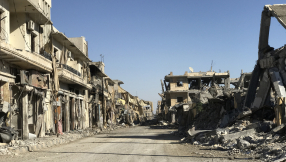U.N. Sees Afghan Suicide Bombings at Record in 2007
Militants carried out 103 suicide attacks between January and the end of August this year, compared to 123 attacks during the whole of 2006, according to a new U.N. report.
Suicide bombings were unheard of in Afghanistan until al Qaeda operatives assassinated anti-Taliban Mujahideen commander Ahmad Shah Masood in 2001, two days before the Sept. 11 hijacked aircraft attacks on the United States.
"Most probably we will end up with a higher number than 123 for the whole year," U.N. special representative for Afghanistan Tom Koenigs told reporters ahead of the report launch. "Suicide attacks are an increasingly common and potent weapon of the insurgency."
Attacks have multiplied in tandem with the insurgency by Islamist Taliban guerrillas, who have copied the suicide attack tactics of al Qaeda, and also against a backdrop of rising attacks in neighbouring Pakistan.
But the attacks are far less effective, killing an average of only around three people per attack, which the United Nations puts down to less extensive training and the profile of bombers, who tend to be poor, ill-educated and young -- in contrast to suicide bombers elsewhere in the world.
Suicide attacks killed 305 people in 2006. Of 183 Afghans killed by suicide bombers during the first half of 2007, 121 were civilians -- even though attacks target Afghan government and security forces as well as foreign troops.
ATTACKS UP, BUT MORE AVERTED
However, security forces are also preventing more attacks, with 36 attackers "neutralised" and 34 devices seized during the first six months of 2007, as insurgent circles are increasingly infiltrated. The attackers are all male, and most attacks are centred in urban areas.
Among two dozen failed bombers who were interviewed in prison for the report, two were just 15.
One said he did not understand how the explosive device he was supposed to detonate worked. Another said he had been promised around $165 if he carried out the attack, and believed he would survive the planned blast to spend it.
Bomber motivation ranged from anger at perceived foreign military occupation to government corruption, dishonour and humiliation.
"Our recommendation is that the counter-insurgency forces have to reduce civilian casualties and conscientiously work to uphold the dignity and the honour of the Afghans to avoid provoking an outraged population into volunteering for Jihad," Koenigs said.
And closer cooperation is needed between Afghanistan and neighbouring Pakistan, where some Afghan suicide bombers have attended Madrasa religious schools in tribal areas along their shared, porous border, the report said.
"The cross-border element is so strong that only a joint and cooperative approach can finally beat the movement of suicide bombers, because we have the same problem in the north of Pakistan as we have in the south of Afghanistan," Koenigs said.
The United Nations would also like to see Muslim countries involved in providing security and reconstruction in Afghanistan, and national security services to shoulder more of the burden.
More than 7,000 people have been killed during the past 19 months in Afghanistan, the bloodiest period since the now-resurgent Taliban's overthrow in 2001.













